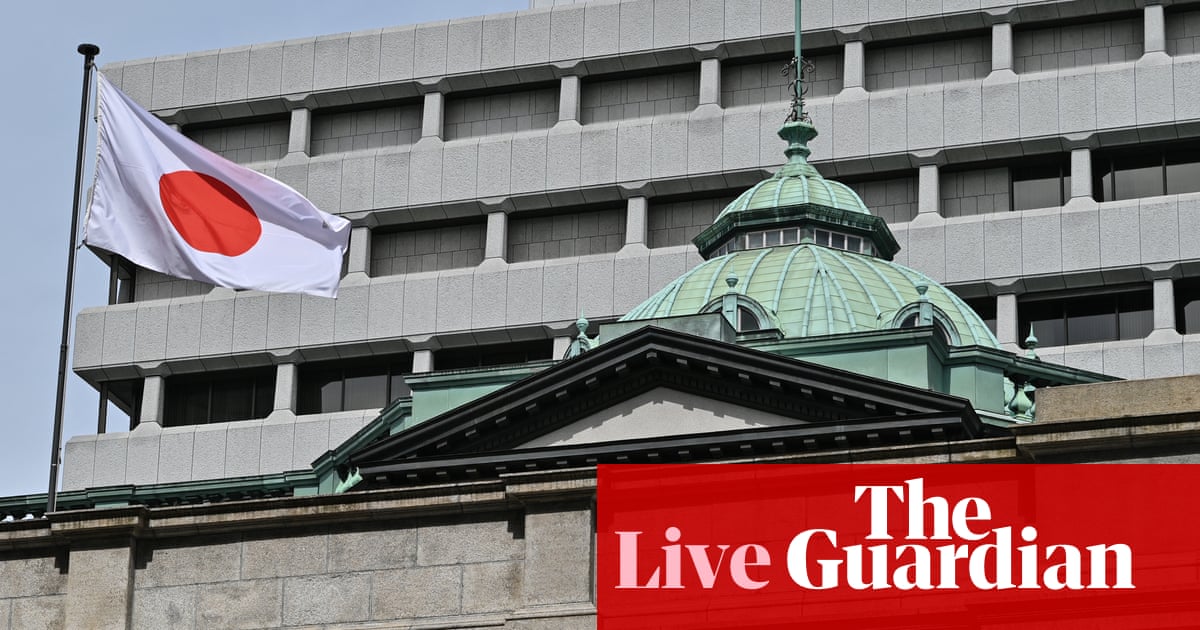Introduction: Bank of Japan ends era of negative interest rates
Good morning, and welcome to our rolling coverage of business, the financial markets and the world economy.
Itâs the end of an era in central banking today, as Japan halts its policy of operating negative interest rates.
The Bank of Japan has raised borrowing costs for the first time since 2007, choosing to tighten policy after fears of deflation ebbed.
It is raising Japanâs interest rates from -0.1% to between zero and 0.1%, ending an eight-year stint of negative borrowing costs, brought in to stimulate spending and borrowing.
#Japan raises interest rates for 1st time in 17yrs amid higher inflation & rising wages. BoJ also scrapped its complex yield curve control program while pledging to continue buying long-term govt bonds as needed. It also ended its purchases of ETFs. Nikkei gained 0.7%, 10y⦠pic.twitter.com/HNSIGqibUr
— Holger Zschaepitz (@Schuldensuehner) March 19, 2024
It has also ended its yield curve control (YCC) policy, under which it has been capping long-term interest rates around zero since 2016.
The move makes the BoJ the last central bank to unwind the ultra-loose monetary policy imposed after the financial crisis.
Announcing the move, the BoJ declared that its goal of hitting 2% inflation in a sustainable and stable manner was in sight, adding:
âIt [the BoJ] considers that its large-scale monetary easing measures have fulfilled their roles, including the negative interest rate policy and the yield curve control.â
Several major Japanese companies, including Honda, Nippon Steel and ANA Holdings, have recently handed workers their biggest pay rise in over three decades, which has bolstered policymakersâ hopes that prices will rise sustainably.
The BoJâs timing is slightly ironic, coming as other major central banks ponder how soon they can risk loosening policy. Both the US Federal Reserve and the Bank of England are expected to leave rates on hold this week.
Markets have taken the news in their stride, with Japanâs Nikkei 225 index rising by 0.66% to close at 40,003 points, up 263.16, today.
Stephen Innes, managing partner at SPI Asset Management, says:
As the Bank of Japan (BoJ) made significant policy changes, crossing what can be seen as a Rubicon in its monetary approach, the moves had been extensively communicated to the market beforehand.
Consequently, the adjustments were largely anticipated, and the markets had priced them in almost perfectly.
BoJ governor Kazuo Ueda is giving a press conference now, to outline the decision, so weâll have more details shortlyâ¦
The agenda
-
10am GMT: ZEW index of eurozone economic sentiment
-
12.30pm GMT: US housing starts for February
-
3pm GMT: Chancellor of the exchequer Jeremy Hunt faces questions from the Economic Affairs Committee
Key events
Kazuo Ueda also signalled that the BoJ could raise interest rates higher, if conditions require it.
The BoJ governor says:
âIf our price forecast clearly overshoots or, even if our median forecast is unchanged, we see a clear increase in upside risk to the price outlook, that will likely lead to a policy change.â
BoJ governor Kazuo Ueda says there is a higher chance that Japan will hit its target of maintaining inflation at 2%.
He tells reporters:
âThe likelihood of inflation stably achieving our target has been heightening, including from January through March … As a result, the likelihood reached a certain threshold that resulted in todayâs decision.
If the likelihood heightens further and trend inflation accelerates a bit more, that will lead to a further increase in short-term rates.â
Core inflation in Tokyo rose to 2.5% year-on-year in February, data released this month shows. However, core inflation (stripping out energy and food costs) slowed.
BoJ holds press conference
Bank of Japan governor Kazuo Ueda is briefing reporters in Tokyo now about todayâs interest rate decision.
Ueda points out that the move will only raise short-term interest rates by 0.1%, and pledges that the BoJ will âincrease bond buying nimblyâ if it sees a sharp rise in long-term rates.
Ueda says:
I donât think deposits or lending rates will rise sharply from todayâs decision.
âWe reverted to a normal monetary policy targeting short-term interest rates, as with other central banks. We will choose the appropriate level of short-term rates in line with our economic and price outlook. But in doing so, we need to be mindful that there is some distance for inflation expectations to reach 2%. When we focus on this gap, itâs necessary to maintain accommodative monetary conditions even under a normal monetary policy framework.â
(Thanks to Reuters for the translation).
Yen weakens to two-week low
Perhaps surprisingly, the Japanese yen weakened after the Bank of Japan raised interest rates today.
The yen fell through the 150 point against the US dollar, down from 149, the lowest in two weeks.
Typically, higher interest rates should support a currency. But the BoJâs move had been well telegaphed, so perhaps it was priced in.
Kyle Rodda, senior financial market analyst at capital.com, explains:
The Bank of Japan lifted rates for the first time in seventeen years while also dialling back its asset purchases and scrapping its yield curve control program. Despite swaps implying that â at best – five points of the 10-point hike was baked into the market, the reaction was limited, if not slightly paradoxical.
The Yen slid, and the Nikkei popped, the latter taking its lead from the former, which arguably has been sold after a build-up in long positioning going into the event. Nevertheless, the meeting was one of the marketâs great non-events, although there could still yet be a response when European and US markets come online.
Introduction: Bank of Japan ends era of negative interest rates
Good morning, and welcome to our rolling coverage of business, the financial markets and the world economy.
Itâs the end of an era in central banking today, as Japan halts its policy of operating negative interest rates.
The Bank of Japan has raised borrowing costs for the first time since 2007, choosing to tighten policy after fears of deflation ebbed.
It is raising Japanâs interest rates from -0.1% to between zero and 0.1%, ending an eight-year stint of negative borrowing costs, brought in to stimulate spending and borrowing.
#Japan raises interest rates for 1st time in 17yrs amid higher inflation & rising wages. BoJ also scrapped its complex yield curve control program while pledging to continue buying long-term govt bonds as needed. It also ended its purchases of ETFs. Nikkei gained 0.7%, 10y⦠pic.twitter.com/HNSIGqibUr
— Holger Zschaepitz (@Schuldensuehner) March 19, 2024
It has also ended its yield curve control (YCC) policy, under which it has been capping long-term interest rates around zero since 2016.
The move makes the BoJ the last central bank to unwind the ultra-loose monetary policy imposed after the financial crisis.
Announcing the move, the BoJ declared that its goal of hitting 2% inflation in a sustainable and stable manner was in sight, adding:
âIt [the BoJ] considers that its large-scale monetary easing measures have fulfilled their roles, including the negative interest rate policy and the yield curve control.â
Several major Japanese companies, including Honda, Nippon Steel and ANA Holdings, have recently handed workers their biggest pay rise in over three decades, which has bolstered policymakersâ hopes that prices will rise sustainably.
The BoJâs timing is slightly ironic, coming as other major central banks ponder how soon they can risk loosening policy. Both the US Federal Reserve and the Bank of England are expected to leave rates on hold this week.
Markets have taken the news in their stride, with Japanâs Nikkei 225 index rising by 0.66% to close at 40,003 points, up 263.16, today.
Stephen Innes, managing partner at SPI Asset Management, says:
As the Bank of Japan (BoJ) made significant policy changes, crossing what can be seen as a Rubicon in its monetary approach, the moves had been extensively communicated to the market beforehand.
Consequently, the adjustments were largely anticipated, and the markets had priced them in almost perfectly.
BoJ governor Kazuo Ueda is giving a press conference now, to outline the decision, so weâll have more details shortlyâ¦
The agenda
-
10am GMT: ZEW index of eurozone economic sentiment
-
12.30pm GMT: US housing starts for February
-
3pm GMT: Chancellor of the exchequer Jeremy Hunt faces questions from the Economic Affairs Committee











